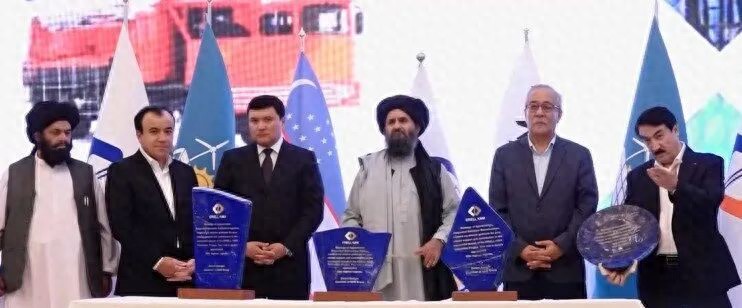Word count: 1509
Estimated reading time: 3 minutes
Author | South Asian Matters
Editor | Jiang Xinyu
Reviewer | Jiang Yi

Photo source: "Central Asian Times" Photo source: WeChat Official Account "South Asian Matters"
After a period of calm, the oil and gas exploration work in Afghanistan has made new progress. This time, the Afghan side has granted the exploration and exploitation rights to Uzbek enterprises.
Uzbek enterprises have started natural gas exploration in the Toti-Maidan gas field in Afghanistan.
According to the "Central Asian Times", Uzbek Energy Minister Jura Bek Mirzakamalov announced on the documentary "The New Path of Uzbekistan — Facts Recognized by the World" aired on Uzbek TV channel 24 that Uzbek enterprises have obtained carbon hydrocarbon exploration and production licenses issued by the Afghan authorities.
Mirzakamalov stated that the Afghan authorities have granted Uzbek enterprises the right to conduct geological exploration and develop carbon hydrocarbon deposits on Afghan territory.
According to a 25-year contract signed with the Uzbek company Eriell KAM, the relevant work has already started in the Toti-Maidan gas field in Juzjan province in mid-September.
Uzbek media quoted Mirzakamalov as saying, "This will be the first phase. Based on the exploration results, we plan to expand the cooperation to new areas. The implementation of this project is a measure that benefits the economies of both Uzbekistan and Afghanistan."
According to the Afghan Ministry of Mines and Petroleum, the Toti-Maidan gas field covers an area of about 7,500 square kilometers and includes about 30 oil wells.
Over the next decade, Uzbekistan is expected to invest approximately $100 million annually and plans to process the extracted oil and natural gas within its own country.
Mirzakamalov emphasized that this initiative reflects the growing role of Uzbekistan in regional energy cooperation and aligns with its policy of building mutually beneficial relations with neighboring countries.
He pointed out that the project aims to support local industries and create job opportunities in both countries.
The report said that in August 2025, energy companies from Uzbekistan and Afghanistan signed a series of agreements in Kabul, planning to implement four major infrastructure projects. These include the construction of a 500-kilovolt Surkhan-Dashat Arvan transmission line, expansion of the Argandab and Nangarhar substations, and upgrading the Kabul-Nangarhar power corridor (Kabul-Nangarhar power corridor).
The signing of a 25-year contract between the Taliban authorities and Uzbek enterprises reminds people of a recent event that caused great dissatisfaction among Chinese enterprises.
On June 17, 2025, the Afghan Ministry of Mines and Petroleum announced the termination of the contract for the Amu Darya oil field development signed with Xinjiang Central Asia Petroleum and Natural Gas Co., Ltd. in 2023, citing the failure of the Chinese enterprise to fulfill the commitments in the contract.
The Afghan side pointed out that the Chinese enterprise did not meet the investment commitments in the first year, actually investing only $46 million, far below the $150 million required by the contract. Moreover, no large-scale petroleum equipment was imported, and no complete seismic surveys or infrastructure repairs were carried out at the oil field.
In addition, the drilling schedule lagged behind the plan by 40%, and the refinery remained at the drawing stage. Twelve Chinese engineers' qualifications were not recognized by the Afghan side. Furthermore, the Afghan side accused the Chinese enterprise of violating regulations by exporting crude oil, insufficient environmental protection measures, and a significantly low proportion of local employees being hired.
This contract was signed between the Taliban government of Afghanistan and the Chinese enterprise, initially seen as the first major resource development agreement signed by the Taliban since regaining power in 2021.
Analysts say that due to factors such as constantly changing policies, poor working environment, instability, international sanctions, and weak rule of law, the risks of participating in oil and gas resource extraction in Afghanistan are extremely high, and Chinese enterprises have paid a heavy price and learned profound lessons.
Will Uzbek enterprises smoothly advance the project? Everyone is watching.
This article is reprinted from the WeChat official account "South Asian Matters" on October 8, 2025, titled "After Terminating the Contract with Chinese Enterprises, the Taliban Authorities Grant Exploitation Rights to This Company."
Editor: Jiang Xinyu
Reviewer: Jiang Yi
* Send "translation" to the official account's backend to view the previous translation collection.

We welcome your valuable opinions or suggestions in the comments section, but please ensure that your language is friendly and respectful. Any comments with offensive or insulting language (such as "A San") will not be accepted.
Original: https://www.toutiao.com/article/7559260542788026880/
Statement: The article represents the views of the author. Welcome to express your attitude in the 【Up/Down】 buttons below.